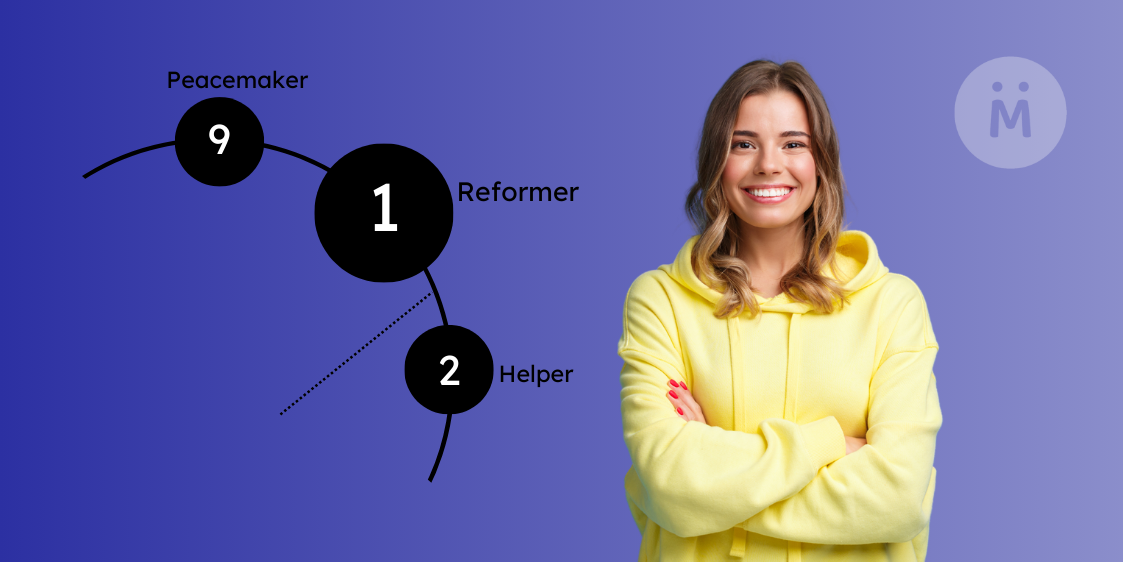Understanding Enneagram Type 1: The Reformer
Margo Plater

Outstanding Qualities of Enneagram 1 Individuals
- High Standards: Enneagram 1s are known for their strong sense of right and wrong.
- Integrity: They have high standards and are committed to doing what is morally and ethically right.
- Detail-Oriented: Enneagram 1s keenly pay attention to detail, and notice nuances that others might miss.
- Organized: They are organized and thrive in structured environments.
- Responsible: They are responsible and take their obligations seriously.
Discovering Your Enneagram Type 1
The Enneagram Test is a psychometric test that aims to decipher what specific personality traits you possess, in hopes of helping you get to know yourself better to implement positive change. There are multiple different results you can get from taking the Enneagram Test, one being Enneagram Type 1. Enneagram Type 1, often known as "The Perfectionist" or "The Reformer," reflects a personality driven by a strong inclination to achieve perfection and continuous improvement. If you resonate with a desire to uphold principles and values while meticulously pursuing your goals, you might find yourself aligned with this personality type. In this article, you will delve into the relationships, tendencies, growth paths, career paths, as well as many other subcategories of your enneagram result.
Unveiling Core Motivations
At the core of Enneagram Type 1's characteristics lie motivations that significantly influence your thoughts, feelings, and behaviors. Rooted in pursuit of excellence and integrity, your drive is fueled by a deep need to shape your environment to match your high standards. This constant push for improvement defines your approach to various aspects of life.
Navigating the Enneagram System
To gain a true grasp of Enneagram Type 1, it's essential to comprehend the broader Enneagram system. This ancient personality framework categorizes individuals into nine distinct types, each characterized by its own set of unique traits and motivations.
The Landscape of Nine Personality Types
- Type 1 - The Perfectionist
- Type 2 - The Helper
- Type 3 - The Achiever
- Type 4 - The Individualist
- Type 5 - The Investigator
- Type 6 - The Loyalist
- Type 7 - The Enthusiast
- Type 8 - The Challenger
- Type 9 - The Peacemaker
Understanding these types, their desires, and fears offers valuable insights into not only your own motivations but also the behaviors and attitudes of those around you.

Delving Deeper into Your Type 1 Personality
Embracing Your Type's Traits
As an individual of Enneagram Type 1, your distinct traits encompass a profound sense of responsibility and unwavering moral integrity. Your tendency to set high standards for yourself and others often leads to perfectionism. Your pursuit of positive change drives you to dedicate meticulous effort across various aspects of your life.
Pathways for Personal Growth
While your strengths are noteworthy, there are opportunities for growth. Balancing your pursuit of perfection with self-compassion and flexibility can help you navigate challenges more gracefully. Embracing the notion that growth involves embracing mistakes allows you to cultivate resilience and adaptability.
Unveiling Your Profound Characteristics as a Perfectionist
Welcome to our comprehensive exploration of the intricate nature that defines you as a perfectionist. In this insightful piece, we delve deep into your strengths and positive attributes, as well as the challenges and potential growth areas that shape your journey. Our goal is to provide not just information, but a valuable resource that takes you on a journey through your own world of perfectionism.
Your Strengths and Positive Attributes as a Perfectionist
You possess a variety of remarkable strengths and attributes that set you apart in various aspects of life. Your meticulous attention to detail is unparalleled, enabling you to excel in professions that demand precision, such as science, engineering, and creative arts. This characteristic also translates into your personal life, where you tend to be incredibly organized and capable of executing complex tasks flawlessly.
Furthermore, your high motivation and unrelenting drive to achieve excellence are truly commendable. Your pursuit of perfection often leads to innovation, as you continuously seek ways to optimize processes and outcomes. This work ethic not only benefits you personally but also elevates the standards of the teams and projects you are involved in.
Challenges You Face as a Perfectionist and Areas of Potential Growth
While your strengths are impressive, you are not immune to challenges and stressors that arise from your unique nature. One notable challenge is your tendency to set unrealistically high standards for yourself and others. This can lead to feelings of frustration and disappointment when these standards are not met, potentially hindering collaboration and causing undue stress.
You might also find it challenging to delegate tasks due to your desire to maintain control over the quality of work. This can lead to burnout and limit your ability to take on larger projects. Additionally, your pursuit of perfection can sometimes lead to overthinking and excessive self-criticism, which can undermine your self-confidence and hinder your overall growth.
Embracing Growth: Potential Strategies for You
It's important for you to recognize that growth lies in finding a balance between your pursuit of excellence and your well-being. One effective strategy is practicing self-compassion, which involves treating yourself with the same kindness and understanding that you would offer to a friend. This can help alleviate the pressure you put on yourself and foster a healthier mindset.
Learning to delegate tasks and trusting others with responsibilities can also be transformative for you. By allowing others to contribute, you not only lighten your own workload but also empower your colleagues and promote a more collaborative environment.
Incorporating mindfulness and stress-reduction techniques can aid you in managing your anxiety and reducing overthinking. This can lead to increased focus and clarity, ultimately enhancing your performance and overall satisfaction.
Exploring Enneagram Wings: A Comprehensive Guide
In the world of personality typing and self-discovery, the Enneagram system is a powerful tool for understanding your behavior and motivations. Among the various aspects of this system, Enneagram wings play a pivotal role in shaping your personality and actions. In this comprehensive guide, we'll delve into the intricacies of Enneagram wings, with a particular focus on Type 9 Wing: The Achiever and Type 2 Wing: The Investigator.
Unveiling Your Enneagram Wings
Enneagram wings are like the subtle flavors that enhance the richness of your personality type. They are the adjacent numbers on the Enneagram diagram and contribute unique traits to your core type. For example, if your core type is 1, your wing can be either 9 or 2. These wings influence your behavior, attitudes, and reactions in specific ways.
Enneagram Type 1 with a Wing 2
Characteristics
- Individuals with an Enneagram Type 1 wing 2 exhibit a blend of perfectionism and a nurturing, helpful nature.
- They are often driven by a desire to make the world a better place through their high moral standards.
- These individuals tend to be compassionate, empathetic, and willing to assist others in their pursuit of perfection.

Enneagram Type 1 with a Wing 9
Characteristics
- Those with an Enneagram Type 1 wing 9 blend the perfectionism of Type 1 with the peacemaking tendencies of Type 9.
- They seek harmony and balance in their lives, often avoiding conflict.
- These individuals may struggle with procrastination as they try to maintain their inner calm.
In summary, Enneagram Type 1 wings play a pivotal role in shaping an individual's personality and behavior. Whether it's the compassionate and helpful tendencies of a Type 2 wing or the harmonious and peaceful qualities of a Type 9 wing, understanding these nuances is crucial for self-awareness and personal growth.
Elevating Your Relationships: A Comprehensive Guide
In the ever-evolving landscape of today's world, the significance of nurturing healthy relationships cannot be overstated. At Maslow, our mission is to provide you with invaluable insights and strategies that will empower you to cultivate meaningful family dynamics, effective communication, genuine friendships, and profound romantic connections. Our guide aims to equip you with the tools you need to forge relationships that thrive and endure.
Unveiling the Dynamics of Family and Communication
Within the realm of family dynamics lies the key to lasting bonds and mutual understanding. At Maslow, we're dedicated to helping you unlock the potential of these dynamics and foster relationships that flourish:
Embrace Transparent and Sincere Communication
The cornerstone of any strong family unit is transparent and sincere communication. We encourage you to initiate open dialogues, practice active listening, and extend mutual respect to all family members. By creating a safe space for dialogue, conflicts can be resolved harmoniously, strengthening the foundation of trust within the family.
Cherish Quality Moments Together
The value of shared quality time cannot be emphasized enough. Engaging in activities that resonate with each family member's interests nurtures a sense of togetherness and shared memories. These shared experiences become the threads that weave a tapestry of connection.
Celebrate Individuality
By acknowledging and respecting individual aspirations and values, you can create an environment that thrives on diversity and understanding, fostering an atmosphere of unity.
Cultivating Meaningful Friendships and Social Bonds
The tapestry of life is woven with the threads of meaningful friendships, which provide solace, companionship, and support. Maslow underscores the essence of cultivating friendships that enrich your life:
Connect Through Shared Interests and Activities
Forge connections with individuals who share your passions. Engaging in activities you both enjoy provides a natural platform for bonding and cultivating lasting connections.
Nurturing Empathy and Support
Genuine friendships are built on the pillars of empathy and support. Being a steadfast presence during both triumphs and trials deepens the bond, fostering an unwavering sense of companionship.
Prioritize Quality Over Quantity
While a vast social circle can be appealing, Maslow advocates for a focus on a select few quality friendships. Investing your time and energy in relationships that bring positivity and growth results in more meaningful and lasting connections.
Navigating Romantic Relationships and Fostering Intimacy
Romantic relationships are a realm of profound emotional connection, trust, and intimacy. Maslow recognizes the importance of nurturing these bonds:
Master the Art of Communication
Effective communication is the cornerstone of a strong romantic relationship. Transparently expressing thoughts, feelings, and concerns fosters a deeper understanding of each other's desires and needs.
Constructing a Foundation of Trust
Trust forms the bedrock of a thriving romantic bond. Consistency, honesty, and transparency contribute to building and maintaining a foundation of trust with your partner.
Embrace Emotional Intimacy
Emotional intimacy involves sharing your vulnerabilities, dreams, and thoughts with your partner. This level of vulnerability forges a profound connection, allowing both individuals to feel genuinely seen and understood.

Navigating Your Journey to Professional Excellence: Mastering Leadership and Decision-Making
In the realm of professional growth and success, your journey toward perfection demands a meticulous understanding of the intricacies involved in leadership, decision-making, and overcoming workplace challenges. As experts in the field, we recognize the significance of these aspects and aim to guide you on a transformative journey toward excellence.
Embracing Leadership: Your Pathway to Success
Leadership stands as the cornerstone of your successful career trajectory. It is the art of influencing, guiding, and motivating individuals toward a collective goal. To truly excel as a leader, you must embody empathy, resilience, and effective communication. Nurturing these attributes not only elevates your own career but also fosters a positive and productive work environment.
Cultivating Empathy for Effective Leadership
Empathy, often described as the ability to understand and share the feelings of others, is a fundamental trait for a successful leader. By empathizing with your team members, you can establish a deeper connection, identify their needs, and provide appropriate support. This interpersonal skill creates a harmonious work atmosphere, where collaboration flourishes and individuals feel valued.
The Power of Resilience in Leadership
Resilience is the bedrock upon which you can overcome challenges and setbacks. The professional landscape is fraught with uncertainties; however, a resilient leader maintains composure, adapts swiftly, and guides their team through adversities. This unwavering spirit not only instills confidence but also demonstrates exemplary leadership, inspiring others to persevere.
Effective Communication: The Key to Influential Leadership
Communication is the linchpin of successful leadership. Your ability to convey your vision, expectations, and feedback with clarity profoundly impacts team dynamics. By honing this skill, you foster transparency, minimize misunderstandings, and create a collaborative environment where ideas flow freely.
Mastering Decision-Making: Paving the Way for Your Accomplishments
In the intricate web of professional advancement, your ability to make informed and strategic decisions is imperative. Decision-making is an art that requires analytical thinking, risk assessment, and a deep understanding of the situation at hand. As we delve into this crucial aspect, we unravel the layers of effective decision-making.
Analytical Thinking: The Foundation of Your Sound Decisions
At the core of every decision lies analytical thinking, a cognitive process that involves breaking down complex problems into manageable components. This approach enables you to assess various factors, weigh pros and cons, and make choices that align with your overarching objectives. By nurturing analytical thinking, you can confidently tackle even the most intricate challenges.
Calculated Risks: A Catalyst for Your Innovation
In the pursuit of excellence, calculated risks often lead to breakthroughs. Effective decision-makers are adept at evaluating risks and rewards, allowing you to seize opportunities that drive innovation and growth. Embracing calculated risks fosters a culture of experimentation and adaptability, propelling both you and your organization toward success.
Conquering Workplace Challenges: Strategies for Your Triumph
The modern professional landscape is rife with challenges that require ingenious strategies for resolution. As you navigate the maze of workplace obstacles, we unveil effective approaches that empower you to thrive in the face of adversity.
Collaborative Problem-Solving: Strengthening Your Team Cohesion
Workplace challenges seldom affect individuals alone; they ripple through teams and departments. Collaborative problem-solving harnesses the collective intelligence of diverse minds, leading to holistic solutions. By encouraging open dialogue and diverse perspectives, you foster an environment where challenges become opportunities for innovation.
Continuous Learning: A Shield Against Your Obsolescence
In a rapidly evolving world, continuous learning is the shield that guards against obsolescence. Adapting to new technologies, methodologies, and industry trends equips you with the tools needed to overcome emerging challenges. Embracing a growth mindset not only enhances your personal capabilities but also contributes to the resilience of your entire organization.

Achieving Personal Growth and Development as an Enneagram Type 1: Balancing High Standards While Embracing Flexibility
Embarking on the journey of personal growth and development as an Enneagram Type 1 individual, also known as "The Perfectionist" or "The Reformer," offers a transformative experience filled with self-improvement opportunities. This personality type is characterized by a strong sense of duty, a natural inclination for order and perfection, and a commitment to high standards. While these attributes contribute to significant accomplishments, they can also lead to inner tension and rigidity. This comprehensive guide is aimed at helping you strike a balance between maintaining your high standards and embracing flexibility, fostering a well-rounded and fulfilling life.
Embracing Flexibility for Your Growth
Embracing the Power of Adaptability
In your journey to thrive, it's essential to acknowledge the power of adaptability. Embracing flexibility doesn't mean compromising your standards; rather, it involves recognizing that imperfections are a natural aspect of life. By understanding that adaptability contributes to growth, you can navigate challenges with an open and receptive mindset.
Incorporating Mindfulness and Acceptance
Mindfulness is a potent tool for cultivating flexibility. Engaging in mindfulness practices enables you to stay present, quieten your critical inner voice, and let go of the constant need for control. Over time, this practice nurtures greater acceptance of imperfections and creates space for personal development.
Balancing High Standards with Self-Compassion
Redefining Your Notion of Perfection
Your inclination to hold yourself to exceedingly high standards can lead to a cycle of disappointment and self-critique. It's essential to understand that perfection is subjective and unattainable. By redefining what perfection means and celebrating progress, you can foster a more positive and compassionate self-perception.
Nurturing Self-Compassion
Cultivating self-compassion is pivotal to your growth. Treating yourself with the same kindness and understanding that you offer a close friend can counter feelings of inadequacy and enhance your emotional well-being. Recognizing that mistakes are opportunities for learning rather than failures is a crucial aspect of self-compassion.
Strategies for Holistic Development
Exploring Novel Experiences
Incorporating flexibility means seeking novel experiences beyond your comfort zone. Engaging in activities that challenge your routines and perspectives can expand your horizons and enhance your adaptability.
Developing Positive Outlets
Channeling your pursuit of perfection into healthy outlets such as creative endeavors, hobbies, or community involvement can allow you to express high standards in a constructive and satisfying manner.
Mastering the Art of Stress Management and Self-Care
In the modern hustle and bustle, stress has become an unwelcome companion in your life. The unceasing demands of work, personal obligations, and the complexities of contemporary living can exact a toll on both your mental and physical well-being. At Maslow, we comprehend the significance of addressing stress and embracing self-care as pivotal elements of maintaining a harmonious and satisfying life. Within this exhaustive guide, we delve into the intricacies of stress, and its profound impact on your mind and body, and equip you with actionable strategies to effectively manage stress, empowering you to lead a healthier, happier life.
Deciphering the Stress Point and Its Multifaceted Effects
Stress, often coined as the body's "fight or flight" response, is a natural reaction triggered by perceived threats or challenges. This reaction prompts the release of hormones such as cortisol and adrenaline, preparing you to confront the situation head-on. Nevertheless, persistent or chronic stress can usher in an array of detrimental consequences, affecting both your mental and physical health.
The Interplay of Mind and Body: Unveiling the Ramifications
Scientific inquiry has shed light on the intricate interconnection between your mind and body. Prolonged stress can manifest as cognitive difficulties, encompassing issues like memory lapses and diminished concentration. Additionally, it can compromise your immune system's efficacy, rendering you more susceptible to illnesses. Chronic stress has also been correlated with cardiovascular complications, heightened blood pressure, and an increased vulnerability to mental health disorders such as anxiety and depression.
Navigating Stress: Your Arsenal of Effective Coping Strategies
At Maslow, we firmly believe that mastering stress management is pivotal for sustaining overall well-being. Our team of experts has curated an array of pragmatic coping strategies to aid you in navigating life's challenges with resilience and finesse.
1. Cultivating Inner Tranquility through Mindfulness Meditation
Mindfulness meditation has garnered substantial attention for its prowess in mitigating stress and fostering emotional well-being. This age-old practice entails immersing yourself in the present moment, allowing you to observe your thoughts without judgment. By integrating mindfulness into your daily routine, you can nurture a sense of inner calm and develop the tools required to effectively manage stress.
2. Embracing the Empowerment of Physical Activity
Engaging in consistent physical activity isn't solely advantageous for your physical health; it profoundly impacts your mental well-being. Exercise triggers the release of endorphins, often referred to as the "feel-good" hormones, which can elevate your mood and alleviate stress. Whether it involves a brisk walk, a yoga session, or a workout at the gym, finding an activity that resonates with you can significantly alleviate stress levels.
3. Nourishing Meaningful Social Bonds
As inherently social beings, cultivating meaningful connections plays a pivotal role in stress management. Spending quality time with friends and family, sharing your thoughts and emotions, and seeking support when necessary can provide a sturdy foundation for emotional resilience. Remember, you're not navigating the journey of stress management alone; reach out and connect.
4. Elevating Self-Care as a Priority
Self-care is not a frivolous indulgence; it's an indispensable necessity. Allocating time for activities that spark joy and relaxation is pivotal for stress reduction. Whether it entails reading a book, indulging in a soothing bath, honing a hobby, or simply relishing a moment of tranquility, self-care rituals possess the capacity to replenish your energy and equip you to adeptly manage life's demands.
You: Embodying Enneagram Type 1 in Popular Culture
In the realm of popular culture, the embodiment of Enneagram Type 1 traits can be witnessed through various fictional characters and renowned celebrities. The Enneagram system serves as a valuable lens for understanding distinct personality types, and Type 1, often referred to as "The Perfectionist" or "The Reformer," is characterized by a steadfast commitment to integrity, an inherent desire for order, and an unrelenting pursuit of excellence. In this comprehensive discourse, we delve into the captivating world of Enneagram Type 1 by exploring both notable fictional personas and the celebrities who vividly exemplify its essence.
Fictional Characters That Mirror Your Type 1 Traits
Hermione Granger: A Role that Resonates
Hermione Granger, the astute and diligent student from the enchanting Harry Potter series, mirrors the core attributes of your Enneagram Type 1 disposition. Your unwavering dedication to abiding by rules, seeking justice, and ceaselessly striving for academic brilliance closely aligns with Hermione's personality traits. Her resolute commitment to rectify perceived injustices and uphold fairness within the magical realm vividly echoes your strong moral compass and relentless pursuit of what's right.
Captain Raymond Holt: A Persona of Precision
Captain Raymond Holt, a prominent character from the beloved TV series Brooklyn Nine-Nine, serves as a remarkable embodiment of your Enneagram Type 1 persona. His meticulous attention to detail, unwavering adherence to protocols, and steadfast pursuit of an impeccably organized precinct distinctly reflect your Type 1 attributes. Holt's journey towards embracing vulnerability while steadfastly adhering to his principles adds layers to his character, making him a relatable representation of your growth trajectory as a Type 1 individual.
Celebrities Who Personify Your Enneagram Type 1
Michelle Obama: Inspiring Dedication to Excellence
Michelle Obama, the former First Lady of the United States, stands as a compelling example of an individual who embodies the essence of your Enneagram Type 1 traits. Her resolute commitment to championing social causes, advocating for education, and relentlessly striving for excellence mirrors your strong sense of responsibility and deep-seated desire to make a transformative impact on the world.
Hugh Jackman: A Journey of Perpetual Refinement
Hugh Jackman, the versatile actor renowned for his roles across various genres, personifies Enneagram Type 1 characteristics through his disciplined approach to his craft and his unwavering dedication to philanthropic endeavors. Jackman's continuous pursuit of self-improvement, both professionally and personally, resonates profoundly with your innate drive for perpetual growth and continuous self-refinement.
Analysis of Your Impact
The portrayal of Enneagram Type 1 trait through these captivating fictional characters and esteemed celebrities not only adds depth to their personas but also resonates deeply with you as an individual. The relatability of these characters and personalities stems from their shared struggles and triumphant journeys in upholding their principles while navigating the complexities of life.

Misconceptions about The Perfectionist: Distinguishing Myths from Reality
In the realm of personality types, the Enneagram Type 1, often referred to as "The Perfectionist" or "The Reformer," is often shrouded in various misconceptions. These misconceptions can sometimes obscure our understanding of this personality type and hinder our ability to truly grasp its essence. In this illuminating exploration, we aim to unveil and clarify some of the most prevalent myths about The Perfectionist, enabling you to discern fact from fiction and to gain a deeper, more accurate insight into this unique personality type.
Myth 1: You're Inflexible and Unyielding
Reality: While it's true that you possess a strong sense of principles and a desire for order, this does not necessarily translate to inflexibility. Your commitment to excellence is rooted in a genuine aspiration to improve both yourself and the world around you. You are fully capable of adjusting your approach when presented with new information or more effective methods.
Myth 2: You're All-Work, No-Fun
Reality: Your pursuit of excellence might give the impression of being exclusively work-focused. However, this is a misconception. You recognize the importance of self-care and leisure. Finding satisfaction in achieving your goals, you also acknowledge the significance of balance and know how to savor life's enjoyable moments.
Myth 3: You're Harshly Critical of Others
Reality: While you hold yourself to high standards, this doesn't mean you are constantly critical of others. Your rigorous self-expectations mirror the standards you apply to the world around you. Rather than being overly judgmental, you often provide constructive feedback with the intention of assisting others in their growth and development.
Myth 4: You Can't Handle Mistakes
Reality: You view mistakes as valuable learning experiences rather than failures. Recognizing that growth stems from acknowledging and rectifying errors, you show resilience and an ability to bounce back. You utilize mistakes as stepping stones on your journey toward personal advancement.
Myth 5: You're Always Serious and Stoic
Reality: Although your dedication to your principles may be perceived as seriousness, you are not devoid of emotions. You experience happiness, humor, and playfulness just like anyone else. Your seriousness often reflects your commitment to your beliefs, but it does not define the entirety of your emotional range.
Disentangling the Myths through Understanding
Untangling the misconceptions surrounding The Perfectionist enables us to truly grasp the depth and intricacies of this personality type. With a more accurate perspective, we see individuals who are driven by a sincere aspiration to enhance themselves and the world, who value authenticity and growth, and who possess a remarkable capacity for empathy and understanding.
The Enneagram Journey: From Awareness to Transformation
Steps to Self-Discovery | Continuous Growth and Evolution
The Enneagram offers you a transformative journey, leading you from self-awareness to profound personal growth. Within this intricate system lie nine distinct personality types, each with its own set of motivations, fears, and tendencies. In this insightful exploration, we delve into the stages of Your Enneagram Journey, focusing on the steps to self-discovery, and highlighting the ongoing evolution and growth that emerge from embracing its wisdom.
Step 1: Discovering Your Enneagram Type
Your Enneagram journey commences with self-awareness. To embark on this transformative path, you must first identify your Enneagram type. This involves introspection into your core motivations, fears, desires, and behaviors. Through honest self-reflection and, if needed, professional guidance, you can pinpoint the personality type that resonates most with your inherent tendencies.
Step 2: Understanding Your Type's Patterns
Following the identification of your Enneagram type, the next step is to delve deeply into understanding its patterns. This entails acknowledging both the strengths and limitations associated with your type. By exploring how your type reacts to stress, relationships, and various life situations, you lay the groundwork for self-acceptance and personal growth.
Step 3: Challenging Limiting Beliefs
Your awareness of your Enneagram type's limitations opens the gateway to challenging deeply ingrained beliefs. As you become cognizant of the ways in which your type's tendencies might hinder you, you empower yourself to surpass these limitations. This stage involves introspection, self-compassion, and a dedication to transforming your thought patterns.
Step 4: Embracing Growth and Evolution
Armed with newfound awareness and a readiness to confront limiting beliefs, your journey progresses toward growth and evolution. Integrating the insights of the Enneagram empowers you to tap into the positive attributes of all nine types, contributing to a more harmonious and enriched life experience. Embracing growth necessitates ongoing self-reflection, learning, and a commitment to making conscious choices in alignment with your true self.
Step 5: Cultivating Authentic Connections
As you continue evolving through the Enneagram Journey, you'll find yourself fostering more authentic and profound connections. Understanding both your own motivations and those of others enhances empathy and communication. By recognizing the diverse ways in which people perceive the world, you can cultivate deeper relationships and navigate conflicts with empathy and understanding.
Step 6: Inspiring Others Through Your Journey
The ultimate phase of the Enneagram Journey involves sharing your personal growth and transformation with others. Your journey becomes a testament to the potency of self-awareness and continuous evolution. By openly discussing your experiences, you inspire others to initiate their own quests of self-discovery and personal growth, igniting a chain reaction of positive transformation.
Conclusion
In conclusion, the Enneagram Type 1, often referred to as "The Perfectionist" or "The Reformer," offers you a diverse array of traits and characteristics that contribute to your distinct and multifaceted personality. With your strong commitment to integrity, desire for order, and unwavering pursuit of excellence, you are driven by a profound dedication to personal growth and making a positive impact on the world around you.
Throughout this overview, we've delved into the intricate facets of Enneagram Type 1, exploring its representation in popular culture through fictional characters and notable celebrities. We've dispelled prevalent misconceptions linked with this personality type, revealing the truth behind these myths and highlighting the authentic attributes that define who you are.
The Enneagram Journey of self-discovery and continuous growth stands as a foundational aspect of your experience as an Enneagram One. From recognizing your core motivations to challenging limiting beliefs, embracing your ongoing evolution, and nurturing authentic connections, this journey is a transformative process that leads to heightened self-awareness, increased empathy, and personal fulfillment.



